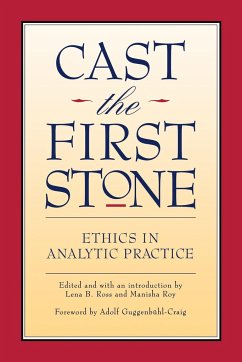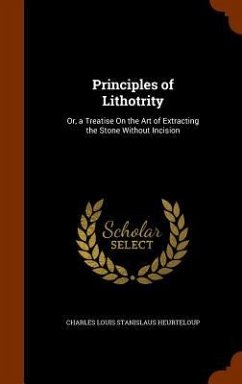
Cast the First Stone
Ethics in Analytic Practice
Herausgeber: Ross, Lena B.; Roy, Manisha
Versandkostenfrei!
Versandfertig in 1-2 Wochen
28,99 €
inkl. MwSt.

PAYBACK Punkte
14 °P sammeln!
Who or what is really being served when an analytic relationship turns sexual? How can health best be restored to an impaired analyst? Do analytic training relationships teach overfamiliarity? Sixteen internationally known Jungian analysts examine the psychology of professional and not-so-professional patient relationships. Their thought-provoking essays will force you to pause, reflect, and question a little more before passing judgment. Codes of ethics evolve over time and may be different from culture to culture. Among the authors that add depth and understanding to current views of moral a...
Who or what is really being served when an analytic relationship turns sexual? How can health best be restored to an impaired analyst? Do analytic training relationships teach overfamiliarity? Sixteen internationally known Jungian analysts examine the psychology of professional and not-so-professional patient relationships. Their thought-provoking essays will force you to pause, reflect, and question a little more before passing judgment. Codes of ethics evolve over time and may be different from culture to culture. Among the authors that add depth and understanding to current views of moral and ethical dilemmas are: VERENA KAST from Zurich, FRED PLAUT from Berlin, JUNE SINGER from San Francisco, ROSEMARY GORDON from London, and LENA B. ROSS and ANN BELFORD ULANOV from New York City. Other authors practice in Israel, Italy, South Africa, and the United States. In medicine and psychotherapy, ethical behavior means one tries to do whatever seems to be the most useful and therapeutic action at the time, realizing that our knowledge is never absolutely sure. There is always room for new information and insight. Even more, it is our duty to question everything we are doing. - Adolf Guggenbühl-Craig, Jungian analyst and author of Power in the Helping Professions CONTENTS: Foreword by Adolf Guggenbiihl-Craig Introduction by Lena B. Ross and Manisha Roy Chapter 1: Ethics at the Fountainhead, June Singer Chapter 2: Eros, Mutuality, and the "New Ethic", John R. Haute Chapter 3: The Need for an Analytic Temenos; Florence C. Irvine Chapter 4: The Scheherazade Solution: Power Abuse and an Ethic of Transformation, Lena B. Ross Chapter 5: Ethics: A Jewish Perspective, Henry Hanoch Abramovitch Chapter 6: Reflections Concerning Ethics, Luigi Zoja Chapter 7: Analysis: Ritual Without Witnesses, Fred Plaut Chapter 8: Ethics in Xhosa Healing, M. Vera Buhrmann and G. S. D. Davis Chapter 9: How to Handle Unethical Behavior in an Ethical Way, Verena Kast Chapter 10: Am I My Brother's Keeper? Impairment in the Healing Profession, Joseph Wakefield Chapter 11: Psyche's Punishment: Holding the Tension Between Spirit and Instinct, ManishaRoy Chapter 12: The Handless Maiden: Ethics as the Transcendent Function, Maria Teresa Rufini Chapter 13: Transference-Countertransference: The Eros-Agape Factor, Rosemary Gordon Chapter 14: The Healing Conjunctio and Its Sexual-Romantic Shadow, John Steinhelber Chapter 15: Self Service, Ann Belford Ulanov














